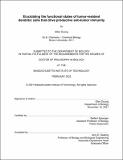Elucidating the functional states of tumor-resident dendritic cells that drive productive anti-tumor immunity
Author(s)
Duong, Ellen
DownloadThesis PDF (15.94Mb)
Advisor
Spranger, Stefani
Terms of use
Metadata
Show full item recordAbstract
While checkpoint blockade immunotherapy (CBT) has demonstrated remarkable clinical efficacy, its success is tempered by an inability to induce responses in the majority of cancer patients. Efforts to understand mechanisms of CBT resistance have unveiled a requirement for a subset of dendritic cells (DC) called Batf3-driven conventional DC1, given their superior ability to initiate tumor-reactive cytotoxic CD8+ T cell responses. The exclusion or functional suppression of DC1 in tumors impedes CBT efficacy and enables tumor immune evasion and outgrowth. While the role of DC1 to anti-tumor immunity has been well-established, much less is known about the contribution of other DC subsets which can be found infiltrating tumors. Furthermore, under inflammation, DC subsets can exist in distinct functional states with differential impacts on their function. In this work, we sought to study DC states associated with productive or dysfunctional anti-tumor immune responses and dissect the signals that drive them.
To study DC states, we compared the DC infiltrate of a spontaneously regressing tumor (MC57-SIY; productive anti-tumor immunity) with a progressing tumor (MC38-SIY; dysfunctional anti-tumor immunity). We identified a novel activation state of CD11b+ conventional DC expressing an interferon-stimulated gene signature (ISG+ DC) that was enriched in regressor tumors. Like DC1, ISG+ DC was capable of driving anti-tumor CD8+ T cell immunity. However, unlike cross-presenting DC1, ISG+ DC activated T cells by crossdressing with pre-formed tumor-derived peptide-MHC complexes. We determined that constitutive tumor cell-derived type-I-interferon (IFN-I) production in regressor tumors was driving the ISG+ DC state. Ablation of tumor cell-derived IFN-I in regressor tumors led to complete loss of anti-tumor T-cell responses in mice lacking DC1. Conversely, addition of IFNβ to progressor tumors induced ISG+ DC and rescued anti-tumor T-cell responses in the absence of DC1.
Our study highlights the untapped stimulatory potential of the DC compartment that can be harnessed to drive anti-tumor CD8+ T cell responses. In ongoing work, we are dissecting the mechanistic signals driving dysfunctional DC in progressor tumors over time. Engaging the functional states of DC or rewiring dysfunctional DC towards these functional states has the potential to strengthen anti-tumor immunity and may improve CBT responses.
Date issued
2022-02Department
Massachusetts Institute of Technology. Department of BiologyPublisher
Massachusetts Institute of Technology